Highland 2.1 showed up on the [Mac App Store](https://itunes.apple.com/us/app/highland-2/id1171820258?mt=12) this afternoon. While it’s a “point one” release, it’s actually our tenth update since Highland 2 debuted in May.
The biggest change you’ll notice in 2.1 is our reorganized Preferences window, which now features four tabs.
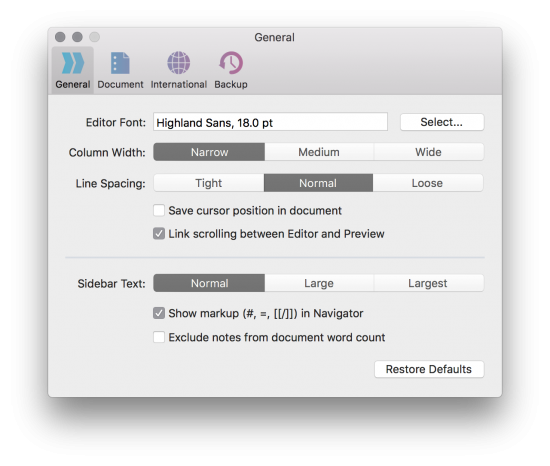
In General preferences, you can choose to exclude notes, synopses and boneyards from word counts in Statistics or the status bar.
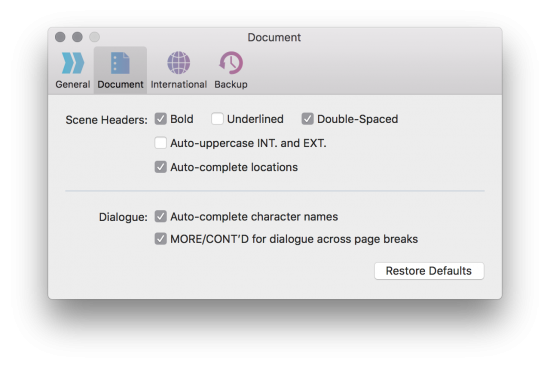
In Document preferences, you can opt to have scene headers underlined.
Scene heading styles are a matter of personal taste. These days, most of my scripts are using single-spaced bold headings, but there’s no one right way.
We debated whether this pane should be “Document” or “Fountain” or “Screenplay.” We ended up going with Document with the expectation that there will likely be more document-focused settings to come, including ones that apply to Markdown.
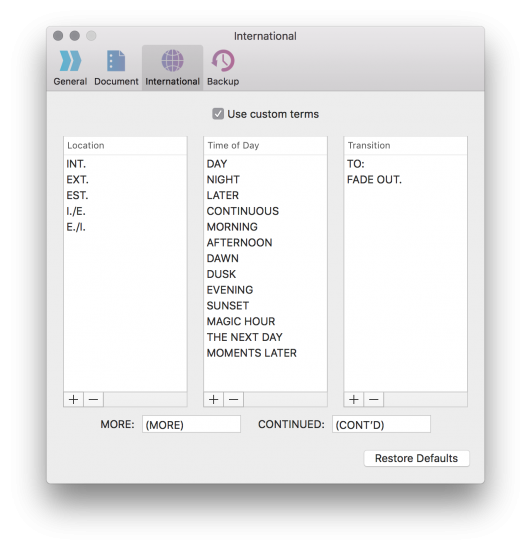
This is big news for screenwriters working in languages other than English. By default, Highland (and other Fountain-based apps) look for certain terms that have special meaning, including INT. and EXT. for scene headings and TO: for transitions. But of course, these are only conventions in English.
With Highland 2.1, writers can add to and amend these lists of terms, including times of day and MORE/CONT’D.
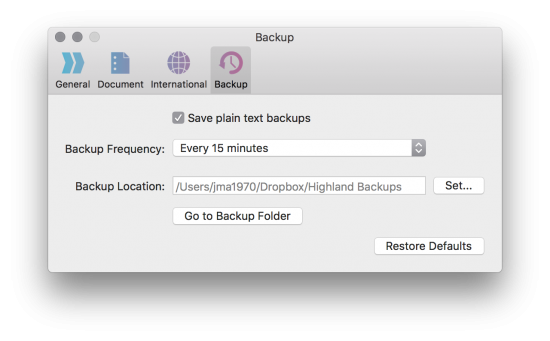
It’s always a good idea to backup your files in multiple locations and multiple ways. For me, the combination is Dropbox plus Time Machine.
In Highland 2.1, we added the ability to regularly back up your current documents in plain text. You can choose a backup folder — I created one on Dropbox — and rest assured that no matter what, there’s always a basic text version of your document stored somewhere.
It’s not an alternative to a consistent, system-wide backup plan, but it can provide a little extra peace of mind.
## Small bit of usefulness
While doing proofreading edits for the second Arlo Finch, I found myself needing to search for specific words a lot. Highland 2 uses the standard macOS Find and Replace system. It’s powerful, but it’s a little cumbersome for what I wanted. So we added **Quick Find**, which keeps your eyes on the screen and fingers on the keyboard.
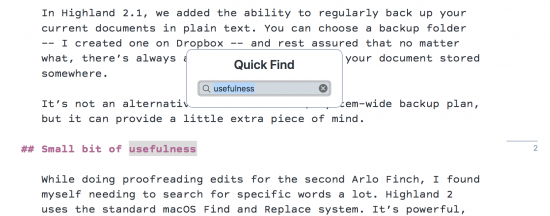
We also added a similar **Jump To…** for quickly hopping around your document’s headers and markers.
Markers can also now be named. Just add a colon and a label: {{%m:label}} You’ll see more functionality with markers coming in future builds.
A few other bits of functionality were introduced in previous builds, some of which you might have missed.
{{SERIES}} inserts auto-incrementing numbers. This was really helpful for Arlo Finch, because I could write headers as

and have it automatically generate the chapter numbers.

You can use {{SERIES}} for anything. For comic books, it’s a useful way to number panels.
{{TIMESTAMP}} inserts the date a document is previewed or printed (including in Fountain title pages). You can [customize the formatting](http://nsdateformatter.com).
We’ve also made two more templates available in the free Highland Basic version: Stage Play and MLA Report.
And if you’re a screenwriter, you owe it to yourself to download our free 40-page booklet on [Switching from Final Draft to Highland 2](https://quoteunquoteapps.com/highland-2/fd-to-h2-guide). It will quickly get you over any fears of leaving Final Draft, and show you some powerful techniques for getting the most out of Highland.
You can find Highland 2.1 on the [Mac App Store](https://itunes.apple.com/us/app/highland-2/id1171820258?mt=12). If you’re enjoying the app, please consider leaving us a review!